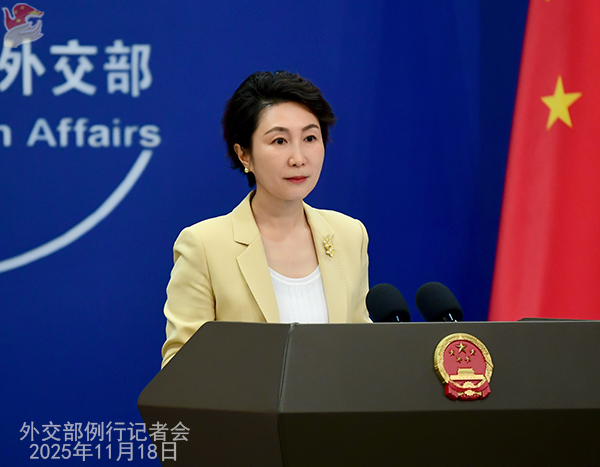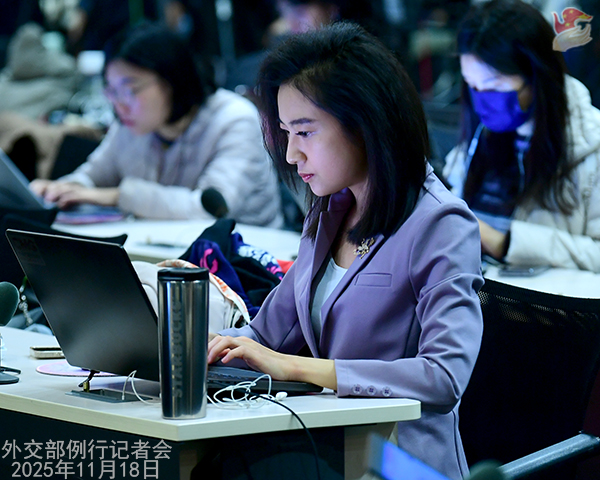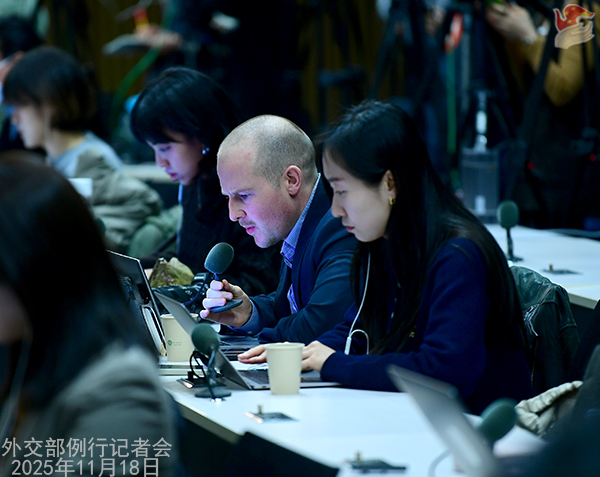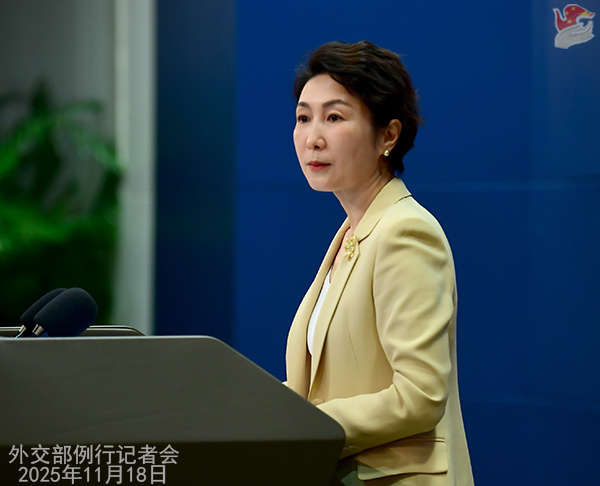
People’s Republic of China


CCTV: Yesterday, King Maha Vajiralongkorn Phra Vajiraklaochaoyuhua of Thailand concluded his state visit to China. Could you share more information with us on the visit, its main achievements and highlights?
Mao Ning: At the invitation of President Xi Jinping, His Majesty King Maha Vajiralongkorn of the Kingdom of Thailand paid a state visit to China from November 13 to 17. This year marks the 50th anniversary of the China-Thailand diplomatic relations and “the Golden Jubilee of China-Thailand Friendship.” This is the first time for the King of Thailand to visit China since the establishment of diplomatic ties and China is the first major country which His Majesty King Maha Vajiralongkorn officially visits after taking the throne.
President Xi Jinping and His Majesty King Maha Vajiralongkorn met on November 14, and reached important common understandings on developing friendly ties between China and Thailand, ushering in greater progress together in building the China-Thailand community with a shared future in the next 50 years, and jointly writing a brand new chapter of China-Thailand friendship. The two heads of state both believe that over the past half-century, facing the changing international landscape, China and Thailand have always worked hand in hand and helped each other, and have truly been good relatives, good friends and good partners. Thailand and China have extensive people-to-people exchanges, and broad-based, in-depth and mutually beneficial cooperation. The cooperation between China and Thailand is cooperation between brothers. Both heads of state agreed that at a critical stage of respective national development and revitalization, China and Thailand should enhance synergy of their strategies so as to deliver more tangible benefits through China-Thailand cooperation to the two peoples. It is important to strengthen cultural connectivity, promote people-to-people exchanges, and bring the two peoples closer through more visits. Premier Li Qiang also met with His Majesty King Maha Vajiralongkorn.
During the visit, King Maha Vajiralongkorn and Queen Suthida laid wreaths at the Monument to the People’s Heroes. They also toured sights in Beijing to see the achievements of China’s modernization up close and promote cultural exchanges between China and Thailand.
We believe that under the joint guidance of the two heads of state, the warm friendship of Jeen Thai Phee Nong Gan (Chinese and Thais are one family) will grow even stronger with time, and China-Thailand relations will make even greater progress in the next 50 years.
AFP: Sources say that Syria intends to hand over jihadist fighters from China’s Uyghur minority to Beijing. Syrian Foreign Minister Asaad Hassan Al-Shibani was on his first visit to China yesterday and the issue of the Uyghur fighters was expected to be on his agenda. Does the Foreign Ministry have a comment on this and did the two sides discuss this issue?
Mao Ning: About the meeting between Chinese and Syrian foreign ministers, we released a readout, which you may refer to.
Let me stress that the Eastern Turkistan Islamic Movement (ETIM) is a terrorist organization designated by China in accordance with the law and listed by the UN Security Council. Combating ETIM is China’s core concern in counterterrorism. The Syrian side commits itself to not allowing any entity to use the Syrian territory to engage in activities that undermine China’s national security, sovereignty, and interests. Both sides agreed to strengthen coordination and cooperation in security and counterterrorism and fight all forms of terrorism.
China News Service: Recently, in a written answer given by Kaja Kallas, the EU High Representative for Foreign Affairs and Security Policy, to MEPs of the European Parliament, she said “On the occasion of the 80th anniversary of the end of World War II in Asia, the EU paid tribute also to the courage of the people of China, who endured immense suffering in defending their homeland and contributing to the end of the war.” What’s China’s comment?
Mao Ning: China noted the statement made by High Representative Kaja Kallas. Eighty years ago, as the main theater of World War II in the East, China has made enormous sacrifice for and great, indelible contributions to the victory of the World Anti-Fascist War. It’s a fact that has gone down in history and is widely recognized by the international community. To uphold the post-WWII international order, one must view history correctly. China and the EU need to promote a correct historical perspective on World War II, resolutely safeguard the fruits of the victory in the War and the international order with the UN at its core, and jointly make greater contributions to world peace and development.

NHK: We’ve learned that Kanai Masaaki, Director-General of the Japanese Foreign Ministry’s Asian and Oceanian Affairs Bureau, today held talks with Liu Jinsong, Director General of the Department of Asian Affairs of China’s Ministry of Foreign Affairs. Can you share the details?
Mao Ning: This morning, Director General Liu Jinsong of the Department of Asian Affairs of China’s Ministry of Foreign Affairs held consultation with Director-General of the Japanese Foreign Ministry’s Asian and Oceanian Affairs Bureau Kanai Masaaki in Beijing.
During the consultation, the Chinese side once again lodged serious protest with Japan over the wrongful remarks made by Japanese Prime Minister Sanae Takaichi concerning China. The Chinese side made it clear that the prime minister’s remarks seriously violate international law and basic norms in international relations, erode the post-WWII international order, and go against the one-China principle and the spirit of the four political documents between China and Japan. Those remarks have caused fundamental damage to the political foundation of China-Japan relations. The egregiousness of both the nature and impact of those remarks has triggered strong outrage and condemnation from the Chinese people. China seriously urges Japan to retract Sanae Takaichi’s wrongful remarks, stop making provocations on issues concerning China, take practical steps to admit and correct the wrongdoing, and uphold the political foundation of China-Japan relations.
Shenzhen TV: It’s reported that on the morning of November 16, four China Coast Guard vessels entered the surrounding waters of Diaoyu Dao. Japan’s Chief Cabinet Secretary Kihara Minoru said on a press conference on November 17 that Japan has lodged a stern protest through diplomatic channels over this. What’s China’s comment?
Mao Ning: Diaoyu Dao and its affiliated islands have always been China’s territory. The patrols and law enforcement of China Coast Guard vessels in China’s territorial waters are legitimate, lawful and fully justified. China does not accept the groundless protest of the Japanese side, and has rejected it and lodged a counter-protest on the spot. China calls on the Japanese side to abide by the four-point principled consensus between China and Japan and respect China’s territorial sovereignty. Japan must not disrupt the patrols and law enforcement activities of China Coast Guard vessels, and must not take any action that may escalate the situation.
AFP: Japan’s embassy in China has warned its citizens here to be careful of their surroundings and to avoid big crowds. Does the Foreign Ministry have a comment on this?
Mao Ning: The Chinese government has always and will continue to protect the safety of foreign nationals in China in accordance with the law.
PTI: A court in Bangladesh yesterday sentenced deposed Prime Minister Sheikh Hasina to death for the incidents of violence that took place during her regime. She of course said it is a rigged trial conducted by an unelected government. She also expressed the willingness to be tried by the International Criminal Court in Hague. What is China’s reaction to this?
Mao Ning: This is the domestic affair of Bangladesh. China pursues a policy of good neighborliness and friendship toward all Bangladeshi people. We sincerely hope Bangladesh will realize solidarity, stability and development.
Global Times: It’s reported that U.S. Ambassador to Japan George Glass on X “thanked” Chinese diplomats for “strengthening the deep bond between the United States and Japan.” What’s China’s comment on this?
Mao Ning: The relevant post of this U.S. Ambassador is pure political stunt and a departure from his capacity and duty as a diplomat. The U.S.-Japan alliance is a product of the Cold War. It should not target any third party, still less blatantly interfere in the internal affairs and undermine the core interests of other countries.
DPA: After holding the high-level financial dialogue with Vice Premier He Lifeng, German Vice Chancellor and Finance Minister Lars Klingbeil said that the two sides talked about the Taiwan question, and the German government is concerned about possible escalation of cross-Strait tensions. What is the Foreign Ministry’s comment?
Mao Ning: The Taiwan question is China’s internal affair. How to resolve it is a matter for the Chinese ourselves and brooks no interference by any external forces. The key to peace and stability in the Taiwan Strait is to uphold the one-China principle and firmly oppose “Taiwan independence.”

Reuters: There seems to be reports saying that the Chinese consulate in Osaka has reached out to Japanese officials there about canceling a Japan-China commemorative event that was planned to be held in Hiroshima on November 21. Is this true and can we get any other comment about this?
Mao Ning: The Japanese side should earnestly abide by the Vienna Convention on Diplomatic Relations and the Vienna Convention on Consular Relations and provide facilitation for Chinese diplomatic and consular missions in Japan in performing their duties.
CCTV: Recently, we’ve seen intense criticism from China on Japanese Prime Minister Sanae Takaichi’s remarks on Taiwan. Some believe that relations between the two countries have hit the lowest point in recent years. Where do you think the relationship is headed?
Mao Ning: The current situation in China-Japan relations is caused by Prime Minister Takaichi’s blatant remarks on Taiwan. Those remarks grossly interfered in China’s internal affairs, violated the one-China principle and the spirit of the four political documents between the two countries, and eroded the political foundation of bilateral relations.
China stands firm to defend its core interests and international justice. Japan must retract its erroneous remarks, repent and change course, offering a clear and satisfactory answer to the Chinese people.
AFP: Asbestos contamination in tubs of children’s play sand imported from China on Tuesday forced a string of school closures in New Zealand. Many schools were also closed in Australia on Monday due to the tainted products. Does the Foreign Ministry have a fresh comment on this?
Mao Ning: We noted the report and that local companies in Australia said they are in communication with suppliers to address relevant issue.
China Daily: Several Japanese officials reportedly said that Japan is planning to revise its Self-Defense Force’s ranking system, including reinstating old Japanese military ranks, such as “Taisa” (colonel). Media comments say that this will break the Self-Defense Force’s convention of downplaying its military nature over the years, and this is adding insult to injury for nations that have suffered from Japanese colonial rule and aggression. What is your comment?
Mao Ning: Due to Japan’s history of colonial rule and aggression, Japan’s military and security moves have been closely watched by its Asian neighbors and the international community. The Potsdam Proclamation explicitly stipulates that Japan shall not be permitted to “re-arm for war.” The Japanese Constitution, which enshrines pacifism, also established Japan’s exclusively defense-oriented policy. It is alarming, however, that in recent years, Japan has drastically readjusted its security and defense policy, increased defense budget year after year, relaxed restrictions on arms export, sought to develop offensive weapons, and planned to abandon its three non-nuclear principles. Japan’s far-right forces are trying every means to break free from the pacifist constitution, and going further down the path of boosting Japan’s military buildup.
Eighty years ago, the war of aggression waged by Japanese militarism inflicted profound sufferings on Asia and the world. Amnesia of war spells disaster; war-mongering spells doom. Lessons from history must not be forgotten, distorted, or even erased. Eighty years on, militarism must never be revived in Japan, the post-WWII international order must never be challenged, and world peace and stability must never be ruined again.
PTI: Yesterday, China along with Russia abstained from the UN resolution on Gaza. Can you just outline the reasons behind China’s abstention?
Mao Ning: The Chinese representative fully outlined China’s position in the explanation of vote on the resolution. China supports the Security Council in taking all necessary moves to realize a lasting ceasefire, ease the humanitarian disaster, and start post-conflict reconstruction in Gaza. The U.S.-drafted resolution is vague about key issues concerning post-conflict arrangement in Gaza, and fails to fully reflect important principles including the “the Palestinians governing Palestine” and the two-State solution. Given the gap between the draft resolution and China’s long-standing position, China did not vote for the draft resolution. China will maintain a constructive and responsible approach, continue to support the just cause of the Palestinian people in restoring their legitimate national rights, and make relentless efforts for the full, just and lasting settlement of the Palestinian question.




